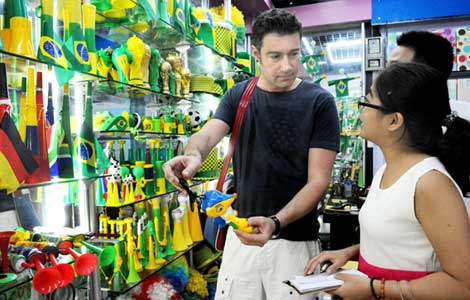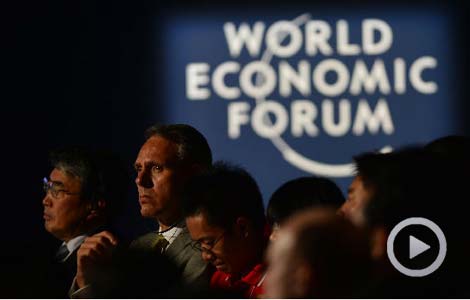Is anger over foreign-auto price mark-ups short-sighted?
Updated: 2013-09-17 11:10
By Michael Barris (China Daily)
|
||||||||
Foreign automakers are attracting anger from government officials and media in China over steep markups on luxury cars.
But the critics miss a key point. China's economy is healthy enough to support the buying.
"A vehicle is often a personal statement about one's wealth and place in the social hierarchy, so many consumers are willing to pay extra to make an impact statement about themselves," Tim Dunne, director of global automotive operations at marketing-consulting firm JD Power and Associates, said in an interview.
The issue came to a head recently when China's Ministry of Commerce said it would move to change rules governing vehicle sales in the world's largest auto market. The announcement capped off a string of news reports casting Audi, BMW and other offshore automakers as the villains in a scenario of jacked-up prices and bad feelings between dealers and automakers.
The government could move to limit auto makers' power to demand a deposit from dealers, the ministry said, to give local dealers more freedom over the vehicles they sell.
But would such a move be appropriate? It's worth noting that so far, one of the loudest critics of high prices on foreign luxury vehicles has been the China Automobile Dealers Association. Luo Lei, the group's deputy secretary, told China Daily last month that his organization would investigate the "unreasonable pricing and excessive profits" of some foreign car brands in China, amid price-fixing investigations on a range of foreign products and sectors.
But buyers apparently don't mind the high prices as much as some people think. Furthermore, claims that foreign companies are conspiring to set sky-high prices also seem unfounded.
China imports about 1 million cars a year, and imports of BMW and Mercedes-Benz, the top two companies, total about 300,000 units. That is less than two thirds the total - the amount required under Chinese law for a market participant to be deemed a monopoly. Underlying the 19.3 million cars delivered in China last year is a domestic auto industry with a healthy amalgamation of Chinese and foreign brands.

Certainly the high price of vehicles is partially due to relatively high duties and fees on vehicles in China, including the import duty - which is at least 25 percent on vehicles -value added tax, consumption tax and so on. The import duty on cars in the US, for example, is only 5 percent, Dunne said.
But that factor is less significant than the idea that when the goal is maximizing profits, it's fair to charge what the market will bear - in other words, the highest price you can sell your goods at in the market you are in.
"The final price paid for any product or service - whether it be a vehicle, a bouquet of flowers, or a meal - is ultimately decided by the buyer," Dunne said. "If the consumer doesn't want to pay the price, they can walk away, or choose something else. This is especially true in China's automotive industry, which offers more brands and models than any other country in the world."
Should there be a "level playing field" for all car makers in China, as critics have suggested? "A free market requires that everyone plays by the same rules," Dunne said. "The goal is not to make every competitor equal, the goal is to make the game fair for everyone. Then let the best companies win."
One wonders how buyers' presumed awareness of the price disparity but lack of regard for it as an issue - because they measure wealth and social status by the high price they pay for these cars - would affect the government/dealer industry effort to deal with these concerns.
"That is a good question," Dunne said. "Clearly, the ability to pay higher prices elevates the social status of the buyer in China. If consumers are willing to pay more to achieve the social recognition they desire, I am not sure how one puts a cap on the pricing."
In light of the handsome profits dealers have raked in on luxury-vehicle sales because of consumers' willingness to pay more for a vehicle that sets them apart from their peers, this anger directed at foreign automakers seems especially myopic.
Contact the writer at michaelbarris@chinadailyusa.com
(China Daily USA 09/17/2013 page2)

 Thirteen dead in US Navy Yard shooting
Thirteen dead in US Navy Yard shooting
 Exporters to face more trade friction
Exporters to face more trade friction
 Toddler-death defendant says he meant no harm
Toddler-death defendant says he meant no harm
 Watchdog bites with no favor
Watchdog bites with no favor
 Miss New York crowned 2014 Miss America
Miss New York crowned 2014 Miss America
 Summers withdraws from Fed chair contest
Summers withdraws from Fed chair contest
 Scientists make land arable again
Scientists make land arable again
 Stranded cruise guests flown home
Stranded cruise guests flown home
Most Viewed
Editor's Picks

|

|

|

|

|

|
Today's Top News
Trending news across China, Sept 17
BRICS pledge cooperation on climate change
CBRC set to regulate 'chaotic' WMPs
Exporters to face more trade friction
Thirteen dead in US Navy Yard shooting
China, US team up on Central Asia
UN confirms nerve gas used in Syria
Minimum growth rate set at 7 percent
US Weekly

|

|






